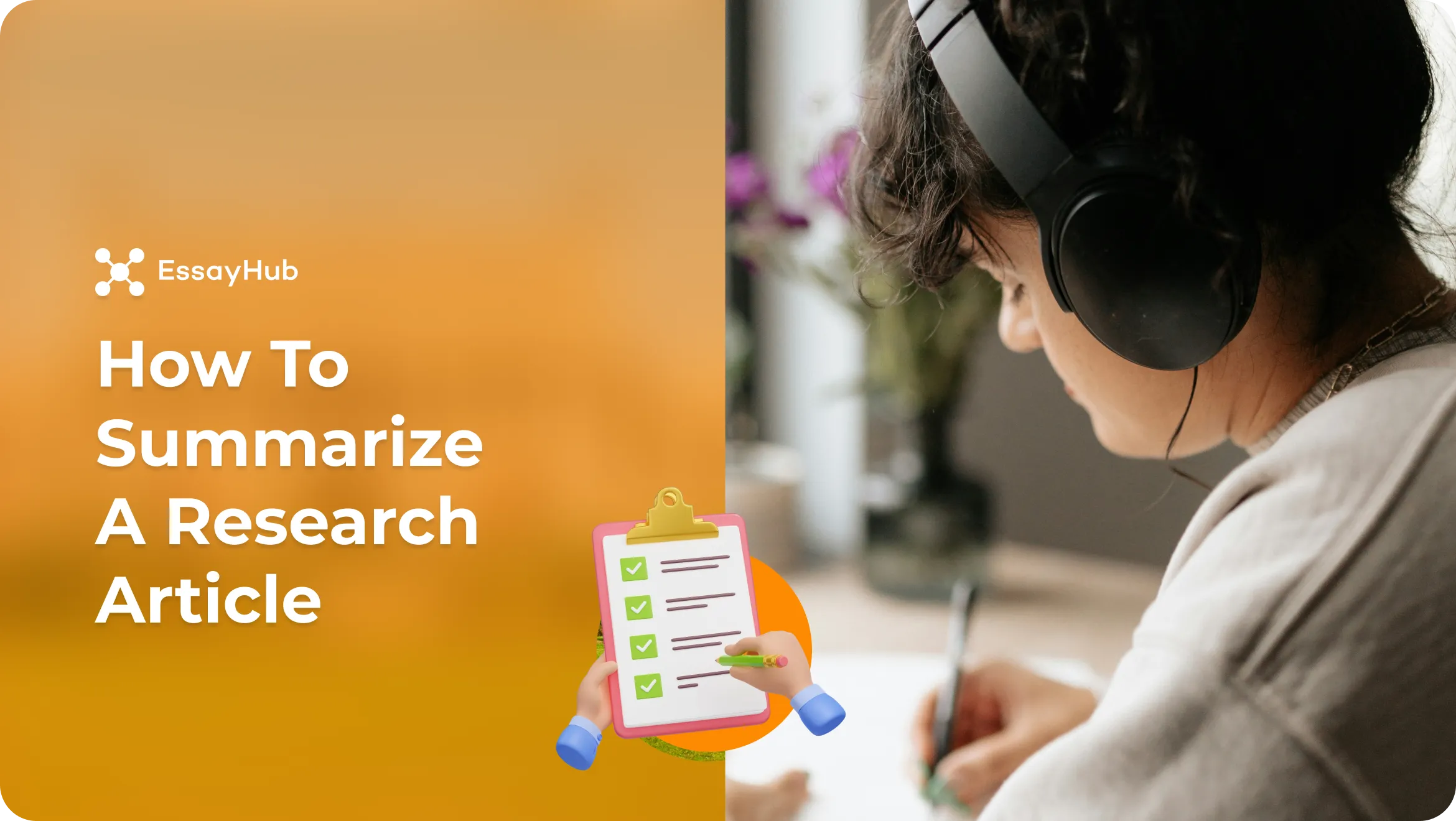Knowing how to write a hypothesis is about predicting what might happen in your study based on what you already know. Follow these steps to create a clear and testable hypothesis.
- Identify the main question you're trying to answer.
- Gather information to deepen your understanding of the topic.
- Make a clear prediction about what you think will happen based on your research.
- Ensure your hypothesis is focused, clear, and easy to understand.
- Test the strength and clarity of your hypothesis by rewording it in three different ways.
With the hypothesis examples and steps we've shared in this article, you'll have a simple process for any research project! And if you're wondering, "Can I pay to write essay?", EssayHub is here to assist with expert guidance throughout the process!
What is a Hypothesis?
A hypothesis is a statement that predicts the outcome of a study or experiment. It suggests a relationship between variables and gives researchers something to test. Based on prior knowledge or observations, a hypothesis is not just a guess. After testing it through research or experiments, the results can either support or disprove it. A well-structured hypothesis outline helps guide the research by focusing on what to measure and how to approach the study.
If you're looking to get your essays done quickly and efficiently, you can easily order essays tailored to your needs.
Hypotheses Variables
When testing a hypothesis, variables are key. These are the things you measure or change in an experiment. Knowing the types of variables helps in designing and understanding experiments. Here's a breakdown from our dissertation writers:
- Independent Variable (IV): This is what you change or manipulate in the experiment. It's what you want to test to see if it affects something else. Example: In an experiment on how exercise affects sleep, the independent variable could be the amount of exercise each participant gets.
- Dependent Variable (DV): This is what you measure to see how the independent variable affects it. It depends on changes made to the independent variable. Example: In the exercise and sleep experiment, the dependent variable could be the quality of sleep, measured by hours of sleep or sleep cycle data.
- Control Variables: These are factors you keep constant during the experiment to ensure only the independent variable is affecting the dependent variable. Example: In the same experiment, control variables could include participants' age, diet, or sleep environment, as these could also affect sleep.
- Extraneous Variables: These are other factors that could unintentionally affect the experiment's outcome but aren't the main focus. While researchers try to control them, they can't always be avoided. Example: External noise, stress, or caffeine intake could affect sleep, but they aren't part of the experiment.
Check out our list of thesis topics.
How to Write a Hypothesis?
Writing a hypothesis is the first step in scientific research. It's a prediction you can test by experimenting or observing. To create a strong hypothesis, you need to be clear, focused, and understand the variables involved. Here's a simple guide:
- Step 1: Pose a Question
- Step 2: Conduct Initial Research
- Step 3: Develop Your Hypothesis
- Step 4: Fine-Tune Your Hypothesis
- Step 5: Rephrase Your Hypothesis in Three Variations
Step 1: Pose a Question
The first step in writing a hypothesis is asking a clear and specific question. This isn't just any question but one that's focused on the problem or phenomenon you want to explore. A well-defined question narrows down your research and guides your hypothesis. For example, instead of asking something broad like "How does studying impact students?" try asking, "How does studying for 2 hours a day affect high school students' exam performance?"
Step 2: Conduct Initial Research
Once you have your question, it's time to gather some background information. Before jumping to conclusions, you need to know what has already been studied on the topic. This step is important in making a hypothesis because it helps you understand what's already been discovered, and it might even inspire new directions for your research. Read articles, studies, or watch lectures related to your topic to get a broader perspective.
Your research doesn't need to be exhaustive at this stage, but it should help you see trends or patterns that will help you form a more informed hypothesis. It can also help you avoid repeating studies that have already been done. For instance, you might find that there are studies on the relationship between study time and academic performance, which could give you a clearer picture of how to approach your hypothesis.
While working on your research paper, learn how to restate thesis in our special guide.
Step 3: Develop Your Hypothesis
Now that you have a clear question and some initial research, it's time to craft your hypothesis. This is your best guess at answering the question you posed earlier. Your hypothesis should suggest a relationship between variables.
For example, if your question is about how studying for 2 hours affects exam scores, your hypothesis could be: "If students study for 2 hours each day, then their exam scores will improve by 10%." This hypothesis is testable, clear, and specific, making it easier for you to design an experiment or study around it. The key is that you're predicting something measurable that can be tested and either confirmed or disproven.
Step 4: Fine-Tune Your Hypothesis
After you have drafted your hypothesis, it's time to fine-tune it. A strong hypothesis is specific, measurable, and testable. It's important to make sure that you can gather data that will either support or refute your prediction. To do this, check if your hypothesis clearly defines the variables involved. For example, is the "2 hours of study" a fixed time frame that can be easily measured? Are you measuring improvement based on a specific set of tests?
Step 5: Rephrase Your Hypothesis in Three Variations
Rewriting your hypothesis in different ways can help solidify your understanding of the topic. It also allows you to explore different perspectives on your research question. Rephrase it to test whether the original idea holds up in different formats.
For example, you could say:
- "If students study for 2 hours a day, their exam scores will improve by 10%."
- "Students who dedicate 2 hours each day to study will see a 10% increase in their test results."
- "Daily study of 2 hours will boost student exam performance by 10%."
These three variations all suggest the same idea but express it in different ways. Rephrasing like this makes sure you understand exactly what you're testing, and it can help you see different paths for analyzing your results. It's a small but effective way to ensure your hypothesis is strong and flexible enough to guide your research.
Examples of Hypotheses
Hypothesis examples help show how different types of predictions can be formed based on various research scenarios. Here are the main types:
- Simple Hypothesis
- Complex Hypothesis
- Null Hypothesis
- Alternative Hypothesis
- Logical Hypothesis
- Empirical Hypothesis
- Statistical Hypothesis
If you find yourself needing a little extra help with your assignment, our custom thesis writing service is here to lend a hand anytime!
Simple Hypothesis
A simple hypothesis makes a direct prediction about the relationship between two variables. It's straightforward and usually involves one cause and one effect.
Example: "Eating more vegetables improves digestion."
This hypothesis predicts that increasing vegetable intake will improve digestion.
Complex Hypothesis
A complex hypothesis involves two or more independent or dependent variables. It predicts relationships between multiple factors.
Example: "Students who study for longer hours and use online resources tend to score higher on exams."
Here, the hypothesis predicts how two factors (study time and use of online resources) influence exam scores.
Null Hypothesis
The null hypothesis states that there is no effect or no relationship between the variables. It's the hypothesis you test against.
Example: "Eating vegetables has no effect on digestion."
This suggests there is no relationship between vegetable consumption and digestive health.
Alternative Hypothesis
The alternative hypothesis suggests there is a relationship or effect between the variables. It is usually tested against the null hypothesis.
Example: "Eating more vegetables improves digestion."
This contradicts the null hypothesis, suggesting that vegetables do have an effect on digestion.
Logical Hypothesis
A logical hypothesis is based on reasoning or theory. It's formed through logical deduction, often built on known facts or patterns.
Example: "If a person drinks water before meals, they will feel fuller and eat less."
This is based on the logical assumption that drinking water increases satiety before eating.
Empirical Hypothesis
An empirical hypothesis is based on observations or experiences, usually derived from data or real-world experiences.
Example: "People who sleep for at least 8 hours a night are more productive the next day."
This hypothesis is formed based on observation or personal experiences about sleep and productivity.
Statistical Hypothesis
A statistical hypothesis is based on statistical methods and involves testing assumptions about a population using sample data. It typically involves the use of probability.
Example: "The average score of students who studied for 5 hours is equal to 80%."
This is a statistical hypothesis that can be tested using data from a sample of students who studied for 5 hours.
How to Make a Good Hypothesis?
A good hypothesis is essential for any research. To create a solid one, base it on your observations or research. This makes sure you are exploring ideas that can be tested and either proven or disproven.
Here's what makes a hypothesis effective:
Final Thoughts
To wrap things up, here's a quick reminder of the steps to write a solid hypothesis:
- Step 1: Ask a Question
- Step 2: Do Some Research
- Step 3: Create Your Hypothesis
- Step 4: Tweak Your Hypothesis
- Step 5: Rephrase It Three Ways
If you're drowning in research or just need a little help, EssayHub is your lifeline. From shaping your hypothesis to simplifying the whole process, our human essay writer is here to make your academic life easier.
FAQs
How to Start a Hypothesis?
Start a hypothesis by identifying the problem or research question you want to explore. Then, think about the relationship between two variables that could provide an answer to the question. Formulate a clear, testable statement based on these variables.
What is an Example of a Hypothesis?
An example of a hypothesis is: "If students study for 2 hours a day, then their exam scores will improve."
How to Write a Hypothesis Statement?
To write a hypothesis statement, clearly state the relationship between two variables. It should be specific and testable. A good hypothesis typically follows the format: "If [independent variable], then [dependent variable]."
Penn State Berks. (n.d.). How to Write a Proper Hypothesis The Hypothesis in Science Writing. https://berks.psu.edu/sites/berks/files/campus/HypothesisHandout_Final.pdf
Hypotheses - The University Writing Center. (n.d.). Tamu.edu. https://writingcenter.tamu.edu/writing-speaking-guides/hypotheses






